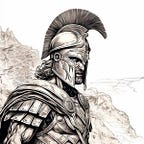Marcus Manlius: A Tale of Roman Virtue and Tragedy
The annals of Roman history are replete with heroic figures, and Marcus Manlius stands as a poignant example of both heroism and the volatility of public opinion in the Roman Republic. His life is a testament to the tumultuous relationship between individual virtue and political intrigue.
A Hero Emerges
In 390 BC, when Rome faced one of its greatest challenges at the hands of the Gauls led by Brennus, it was Marcus Manlius who emerged as a beacon of hope. The Gauls, having defeated the Romans at the Battle of the Allia, laid siege to Rome. As legend has it, one night, the Gauls tried to scale the Capitol. It was not the guards, but the sacred geese of Juno that gave the alarm. Amidst this chaos, Marcus Manlius, roused by the geese, bravely defended the Capitol, pushing the Gauls down the steep incline and saving the city from an imminent breach.
Champion of the Common People
Manlius’s heroism at the Capitol earned him the moniker “Capitolinus.” However, his affinity for the common people was what truly defined his later years. Witnessing the suffering of the plebeians due to debt and the harsh Roman debtor laws, Manlius, out of his own pocket, redeemed many of them from debt slavery. This endeared him greatly to the plebeian class.
As the gulf between the patricians and the plebeians widened, Manlius openly criticized the Senate for their inaction and perceived greed. He advocated for more equitable land distribution and measures to alleviate the economic burdens on the poor.
Fall from Grace
Manlius’s outspokenness made him many enemies among the patricians. Accusations arose that he sought to make himself king, a grave charge in the post-monarchic Republic. In 384 BC, amidst growing political tensions, Manlius was arrested and put on trial.
In a tragic twist of fate, the very hill he had once saved became the stage for his demise. Marcus Manlius Capitolinus, the hero of the Capitol, was found guilty and thrown from the Tarpeian Rock, a traditional execution method for traitors.
Legacy
Marcus Manlius’s life serves as a powerful narrative on the complexities of Roman society. His heroics during Rome’s darkest hour and his compassion for the common people cemented his legacy as a protector of Rome. However, his tragic end underscores the perilous nature of Roman politics and the fine line between hero and traitor in the eyes of the state.
In the end, Marcus Manlius remains a cautionary tale about the fickleness of public opinion and the turbulent interplay between personal virtue and political power in ancient Rome.
- Legion Lore
Further Reading
- Livy (Titus Livius). Ab Urbe Condita Libri (Books from the Foundation of the City). Livy’s monumental history of Rome covers the city’s foundation up until the early 1st century BC. Specific sections deal with the events surrounding the Gallic invasion and Marcus Manlius.
- Cornell, T. J. The Beginnings of Rome: Italy and Rome from the Bronze Age to the Punic Wars. Routledge, 1995. This comprehensive study covers Rome from its origins to the first Punic war, discussing key figures like Manlius.
